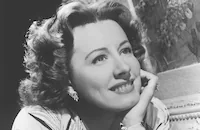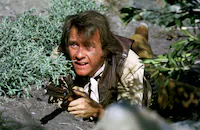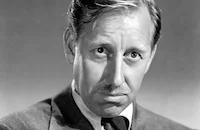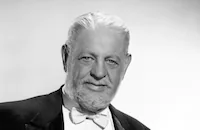It Grows on Trees
Brief Synopsis
Cast & Crew
Arthur Lubin
Irene Dunne
Dean Jagger
Joan Evans
Richard Crenna
Edith Meiser
Film Details
Technical Specs

Synopsis
Polly Baxter runs an efficient, happy household for her husband Philip and their children, Diane, Flip and Midge. The sole irritant to their suburban life is Phil's meager earnings, from which he is saving to open his own accounting practice. One morning, a five-dollar bill blows in through an open window, and although Phil thinks they should look for its owner, Polly insists that they use it to buy shoes for Midge. That night, as Phil chastises his wife for spending ten dollars on two new trees, they realize that the cat is playing with a ten-dollar bill. Polly believes that the money, which they need to pay for home repairs, came to them because they needed it. The next day, however, when they find young Midge playing with thirty-five dollars she found outside, Phil insists on turning it in to the police, even though Diane needs a dress for her college dance. The police arrive a few days later to inform Phil that Polly has claimed the money as her own, and he yells at her. As she cries that they cannot afford to pay for Midge's tonsillectomy, they notice five- and ten-dollar bills floating around the lawn. While Phil calls the airport, thinking a plane may have dropped the money, Polly notices more bills on her new trees and, pulling apart the tree's buds, finds money in each one. Afraid to tell Phil, she covertly questions him on whether money grown on trees is legal, and he tells her to ask the Secretary of the Treasury. When the treasurer's assistant, Finlay Murchison, receives her letter, he, Internal Revenue Service executive John Letherby and Secretary of Agriculture Henry Carrollman compose a joking reply that she is welcome to use the money if it complies with all legal standards. Thrilled by the letter, Polly proceeds to secretly hoard cash. When Diane becomes engaged to bank teller Ralph Bower at the same time that Phil announces he has a one-month business trip, Polly plans a lavish wedding. She renovates the house and pays off the mortgage while Phil is away, attracting the notice of her dishonest neighbor, Mrs. Pryor, who sneaks into the Baxter kitchen one day. There, she finds and steals all the money, moving the letter from the Treasury into the wrong hiding spot. Phil returns from his business trip with the news that he was jailed for passing counterfeit money, which crumbled like dry leaves when he tried to pay for dinner. Soon after, Ralph, who took Polly's mortgage payment at the bank, is demoted when he refuses to inform the manager who paid a mortgage with bills that are now drying up and falling apart. That night, Diane hysterically informs Phil that Ralph accused Polly of counterfeiting, and Polly is forced to admit where the money came from. When she brings Phil outside, however, the trees are stripped bare, and she cannot find the cash or the letter. Phil thinks she is losing her mind. The policemen also question her sanity after Ralph is jailed and Polly tries to get him out. A newspaperman named McGuire overhears her story, however, and, after inadvertently discovering the Treasury letter in her coffee canister, immediately phones in the story of how the government sanctioned the use of home-grown money. Soon, the story spreads and the Baxter home overflows with curious tourists. Murchison, Letherby and Carrollman arrive with a horticulturist, Dr. Burroughs, but when they realize the tree has gone dormant for the winter, the officials demand that Polly retract her story, which will make her a felon. Just then, Burroughs announces that the tree has a bud, and for days the nation waits while it grows. A cold snap almost kills the bud, but Burroughs nurses it along until it yields a tiny ten-dollar bill. After Congress erupts, the government officials pay Polly for her trees, which die anyway because of the cold. Polly insists that the world is full of wonder if people would only believe in it, but a relieved Phil tells her wonder does not mix with real life. He goes off to work as Polly receives her newest bargain, a lamp which, when rubbed, begins to emit a curious smoke that signals a genie inside.

Director
Arthur Lubin
Cast

Irene Dunne

Dean Jagger

Joan Evans

Richard Crenna
Edith Meiser

Les Tremayne
Forrest Lewis
Malcolm Lee Beggs

Frank Ferguson
Bob Sweeney
Dee Pollock

Sandy Descher
John Damler
Clark Howat
Elmer Peterson

Thurston Hall
D. J. Thompson
Cliff Clark
Hal K. Dawson
Jimmy Dodd
Anthony Radecki
Charles Mcavoy
Charles Gibb
Perc Launders
Roy Engel
James Mclaughlin
Frank Howard
Robert Strong
Bob Carney
William O'leary
George Sherwood
Burman Bodel
Ralph Montgomery
Jack Reynolds
Bob Edgecomb
Mary Benoit
Vera Burnett
Walter Clinton
Chuck Courtney
Emile Avery
Madge Blake
Jeanne Blackford
Crew
Leslie I. Carey
Milton Carruth
Richard Deweese
Russell A. Gausman
Jack Gertsman
Maury Gertsman
Leonard Goldstein
Alexander Golitzen
Marshall Green
Julia Heron
Bernard Herzbrun
John Mehl
Leonard Praskins
Dorothy Reid
John Sherwood
Frank Skinner
Barney Slater
Joan St. Oegger
Bill Thomas
Charles Van Enger
Bud Westmore

Film Details
Technical Specs

Articles
Richard Crenna, 1927-2002
Born on November 30, 1927 in Los Angeles, California, Crenna was the son of a pharmacist father and a mother who managed a number of small hotels in the Los Angles area the family owned, where Crenna was raised. At the tender age of 11, he was encouraged by a teacher to audition for a radio show, "Boy Scout Jamboree" at the nearby KFI-AM radio studio. Little did he realize that it would be the start of a very long and prosperous career.
Crenna found steady radio work for the next several years, culminating in 1948 with his breakthrough role of the goofy, squeaky-voiced Walter Denton in the hit radio series Our Miss Brooks. Crenna carried the momentum of his success to television when he spent four more seasons as Walter on Our Miss Brooks (1952-1956). Almost immediately after the run of that show, Crenna scored another hit series as Luke McCoy in the rustic comedy The Real McCoys (1957-1963) co-starring Walter Brennan.
Although he had been acting in films since the early '50s Crenna roles didn't come to critical notice until the mid '60s, appearing in Robert Wise's acclaimed The Sand Pebbles (1966) as the stalwart gunboat captain co-starring Steve McQueen; Terence Young's intense thriller, Wait Until Dark (1967), as a criminal who terrorizes a blind Audrey Hepburn; and another Robert Wise film, the Gertrude Lawrence biopic Star! (1968) playing the high profile role of Richard Aldrich opposite Julie Andrews.
Crenna's profile slowed down in the '70s, despite a brief return to television comedy in Norman Lear's political satire All's Fair (1976-1977) with Bernadette Peters. That show may not have lasted long, but Crenna bounced back with a resurgence in the '80s with a string of hit character parts: Lawrence Kasden's stylish film noir Body Heat (1981), as Kathleen Turner's ill-fated husband; Ted Kotchoff's hit Rambo: First Blood (1982), as Colonel Samuel Trautman, Sylvester Stallone's former Commander; Gary Marshall's excellent coming-of-age tale The Flamingo Kid (1984), one of his best performances (for which he received a Golden Globe nomination) as a smooth, charismatic gin-rummy champ who takes Matt Dillon under his tutelage; and many other quality roles in theatrical and made for television movies.
At the time of his death, Crenna was a member of the Screen Actors Guild board of directors and had a recurring role in the hit CBS dramatic series Judging Amy. In addition to Penni, his wife of 47 years, Crenna is survived by a son, Richard, two daughters, Seana and Maria, and three granddaughters.
by Michael T. Toole

Richard Crenna, 1927-2002
Quotes
Well, for your information, in case you're interested, I have more brains in my head than most people have in their little fingers!- Polly Baxter
Trivia
Notes
The working title of this film was There's Nothing Like Money. According to a June 1952 New York Times article, Universal negotiated with the Treasury Department to be allowed to photograph genuine five-and ten-dollar bills. The article states that, by offering the studio a set of bills under strict guidelines, the Treasury circumvented laws which decree that money cannot be defaced or photographed. Special "Silver certificate issue" bills worth five hundred dollars were released to the production, with their serial numbers noted, to be returned immediately after filming. The bills were watched over by public relations man William Gordon. The studio could only photograph them in a partial view, and any cut-up bills had to be pasted back together before being returned. Although the article discusses the studio's need to dye the bills in colors that would approximate the blossoms of a tree, the film was shot in black-and-white and the only dye used was a brown chemical that made some of the bills appear aged.
Joan Evans was borrowed from Samuel Goldwyn's company for this film. Los Angeles newscaster Elmer Peterson made his screen debut in It Grows on Trees. An Hollywood Reporter news item noted that Irene Dunne received seven and a half percent of the gross profit and director Arthur Lubin received two and a half percent of the net proceeds of the film. On November 16, 1953, Lux Radio Theatre broadcast a version of the story that starred Ginger Rogers and Ted de Corsia, while a Lux Video Theatre version was broadcast on March 17, 1955, starring Ruth Hussey and Robert Preston.














